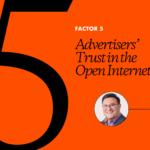The tension between publishers and social media giants shows no sign of slowing down. From Meta’s pivot away from buying publisher content for their News Tab, to Twitter’s decision to remove their Moments feature entirely, it’s difficult to imagine many publishers relying on the major platforms to build audiences.
But there’s a silver lining. The success of brands and publishers on social media has made it clear: audiences want to engage in organic, like-minded communities organized around content.
That’s a huge opportunity for publishers to become the hosts of their own communities—especially when we consider TikTok’s uncertain future in the US.
What’s At Stake?
On March 7th, Senator Mark Warner introduced the RESTRICT Act, a bill that paves the way for nationwide ban of TikTok and other platforms that may lead to surveillance of U.S. citizens by foreign governments. This comes at a time when publishers are investing in TikTok and building video content teams to push to the platform. Their hope is to engage users where they are, rather than divert them to their own websites or apps, as discussed in the story below. A ban would upend that work.
If you feel like you’re experiencing déjà vu, it’s because you are.
Back in 2020, then President Trump signed an executive order addressing the threat posed by TikTok. The order threatened to ban TikTok within the U.S. unless its owner, ByteDance, sold the platform within 45 days.
To mitigate any disruptions, TikTok announced it has reached a deal with the U.S. government in which all traffic stemming from America would go through servers owned and operated through the American company, Oracle.
But according to the New York Times, that deal never came to fruition. If passed, the RESTRICT Act will “authorize the Secretary of Commerce to review and prohibit certain transactions between persons in the United States and foreign adversaries, and for other purposes.”
The Opportunity for Publishers
The potential ban comes at a time when consumers are actively avoiding the news, which poses an existential threat to news organizations across the country and globe.
Social platforms like TikTok, Instagram, and Twitter are now largely viewed as outposts for brands and publishers, delivering content for users to engage with where they already are, rather than directing that traffic to their site or app. Should the Commerce Department move to ban TikTok, Secretary Gina Raimondo can expect pushback from at least some publishers who still see the platform as critical for audience-building.
Between Facebook’s threats to de-emphasize the news, the disarray at Twitter, and a potential loss of TikTok, publishers can bring that user engagement to their own sites, and host conversations on their own domains.
This is not as tall an order as it may seem. Online publishers, from the largest digital media companies to niche publications, already host vibrant communities, and provide their readers with safe and trusted spaces to discuss events and topics they care about.
Properly implemented and managed, these communities benefit publishers in the same ways they have strengthened social media platforms. They facilitate engagement, allow publishers to collect and strengthen their first-party data, and in so doing, future-proof their businesses.


